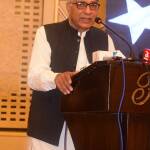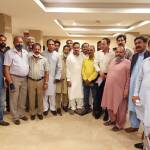LAHORE, Pakistan: Following its tradition of observing National Minorities’ Day every year, the Centre for Social Justice (CSJ) held a 5th Convention on August 10, 2021 on the theme of ‘Equality of Rights: Challenges of Implementation’.
The event was organized in Lahore and involved participants and representatives from a cross section of society and across political parties.
The CSJ’s 5th Convention was also live-streamed through Zoom and Facebook in Rawalpindi, Jhang, Sahiwal, Khanewal, Gujranwala, Narowal, Faisalabad, and Hyderabad.
The discussion focused on ‘equality of rights’ with a special focus on the issue of forced conversion, the National Curriculum Policy’s inconsistency with Article 22-A, and steps taken by the government of Punjab for equal rights for religious minorities.
The convention began with the screening of the documentary “Humsaya” on the issue of forced conversion. The film captured factual stories of minor girls who had been abducted and forced to change their religion. It emphasized that crimes linked to forced conversions can be curbed if the people at large, the majority faith group, neighbours can empathize with victims.
The Executive Director of CSJ Peter Jacob welcomed the guests and introduced the significance of National Minorities’ Day.
CSJ Peter Jacob said, “The state needs to treat forced conversion as a crime, rather than a community Vs another community issue. We cannot cherry pick between issues that impact human lives, rights are important in their entirety.”
The Member of the National Commission on the Rights of Child (NCRC) and human rights activist Dr. Rubina Feroze Bhatti discussed the issues and challenges faced by women and children from marginalized communities.
“Unfortunately till now we have not been able to define the word minority; it cannot be seen only on religious grounds, the political and structural realities of minorities must also be accounted for,” Dr. Rubina Feroze Bhatti said.
The Punjab Minister of Human Rights & Minority Affairs Ejaz Alam Augustine while addressing the gathering said, “We have prepared a draft on the issue of forced conversions in Pakistan. But in addition, we need judicial reform and social awareness about this critical issue.”
On Single National Curriculum he said, “For the first time interfaith subjects are being introduced including Bible, Guru Granth, and Gita and hate material has been removed from 188 books.”
Senator Waleed Iqbal of Pakistan Tehreek-e-Insaf (PTI) said, “The concept of rights of minorities is not a new one rather it dates back to the time when the concept of Pakistan that was established by Allama Iqbal, where all communities will live without any discrimination, unlike the conditions pre-partition.”
Mian Munir from Pakistan Muslim League-Quaid (PML-NQ) on the occasion said, “We appreciate and support the efforts of CSJ and hope they keep helping improve the conditions for human rights in Pakistan.”
Professor Kalyan Singh, “On 11th August we need to focus on the issues that we face as minorities on daily basis and make sure of resolving them. Despite the introduction of the minority quota, its impending implementation has failed the purpose. Since the inception of Pakistan, we still don’t have family laws for minority communities.”
The Punjab Secretary-General of MQM Munir Ahmed said, “There must be federal legislation fixing the legal age for marriage to 18 years of age. This will allow the state to protect the rights of minorities on forced conversions.”
A film was shown in tribute to late veteran journalist and human rights defender Mr I.A Rehman, showing features of his life and struggle.
Background of National Minorities day
On August 11, the founder of Pakistan, Mohammad Ali Jinnah announced in his speech to the nation, “You are free, you are free to go to your temples. You are free to go to your mosques or any other places of worship in this state of Pakistan. You may belong to any religion or caste or creed that has nothing to do with the business of the state.”
Jinnah’s speech emphasized equal and same rights for all citizens although this was a vision that has been repeatedly ignored in the following years. Even though the Constitution of Pakistan guarantees equality of rights, the religious minorities in Pakistan have witnessed and continue to witness violations of human rights, rising intolerance, persecution of religious minorities, forced conversions, discrimination and religion-based violence.
Even then, the struggle for minorities’ rights has continued including the observation of the National Minorities Day which was announced in 2009 and included the active persuasion by Mr. Clement Shahbaz Bhatti, the Christian Federal Minister who was assassinated on March 2, 2011.




